Reinventing Work is the last article of The Ultimate Quest for the Meaning of Work series of articles. I had started it with a Brief History of Work, where I tried to analyse the evolution of the meaning of work across time. I have then explored the framework of The Discourses of Work that I built, to underline how the meaning of Work evolved through history. I then I went deeper into the fifth discourse: Work as Job and The New Discourse of Work that is currently emerging. In the last article, I explored the need to develop new approaches for Work Design, looking at the point of interaction between individuals and organisations.
This last post will focus on the societal and environmental changes and adaptations needed to move to the new Discourse of Work. I will explore some questions about what is not working on the current Work as Job discourse, and look at workers in a more holistic way. This article is also the closure of a loop and brings us back to where it started. Most of this content was written on May 7th, 2020. On the occasion of May 1st, I had written a short post about “Rethinking Work”. In a moment where the Covid19 Pandemics seemed to be at least partially under control, and governments around the world were all planning their “reopening” strategies, Work appeared to be one of the big losers of the economic downturn. On the other side, there had been many calls to look at what could be positively built after this crisis, like the #GoodAfterCovid19 initiative I had taken part in. Other initiatives were blooming on the concept of work and Lars Schmidt posted on Linkedin a request for comment that prompted for some more reasoning from my side. He was looking for “bold ideas” on the way the World of Work should evolve. Reimagining Work now exists as a long collaborative document with many ideas shared from all over the world.
Yet, as mentioned previously, very few are really questioning the evolution of the meaning fo work to something new, that requires a rethinking of “the rules of the game”. Reinventing Work for me is not just about adjusting to some new technologies, but rather rethinking the entire ecosystem of Work, making sure we consistently think of it inclusively, correcting the current distortions that are today present.
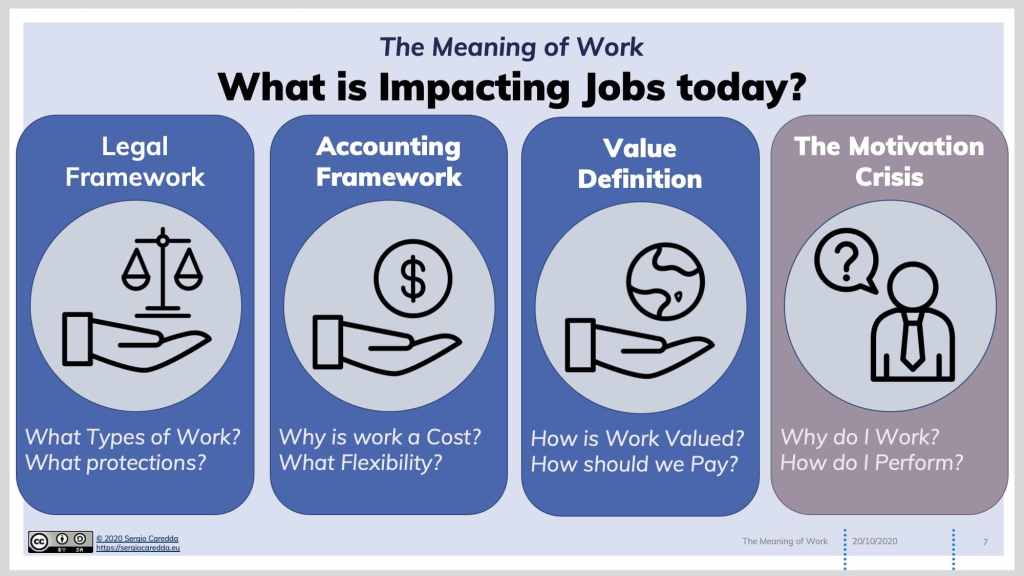
I had originally started my exploration journey precisely from this, the current distortions that affect the way Work are treated by law and finance, and this will again be my starting point. I had then done a PESTLE analysis of the current perception of Work, particularly under the Covid-19 Situation, which you can now find in The New Discourse of Work Article. We will then explore how different clusters of workers are impacted differently by key trends, and how we need to add a new lense to our approach, by focusing on The Dignity of Work.
Reinventing Work: is it possible?
In my answer to the Linkedin Question, I have mentioned three elements that need to be put in place to ensure that a true “Reinvention” of Work can happen.
- Changes in Labour Law that help redefine what Work is and reshape the related protection system, avoiding abuses.
- Changes in Accounting Rules that help redefine the role of Work in the organisational performance. Not just a Cost, but a vital Investment.
- Changes in Value Perception. What is the Value of Work? How do you define the related compensation? With imperfect job markets, also this part needs redefinition.

Work and Labour Law
Current labour law is still based on an old roman distinction between two types of contracts both concerning Work. The locatio conductio operarum is a contract whereby one party agrees to supply the other with a specific quantum of labour. The locatio conductio operis is a contract whereby one party agrees, in consideration of money payment, to provide the other not with work, but with the result of labour. This dichotomy persists and can be traced more or less in all legal systems between employment and service contracts of other types (generally linked to freelancers and self-employed).
What does this mean? In an employment contract, I usually am committing, in exchange for a salary, to deliver an amount of Work measurable in time. The origin of these contracts descend from the master/servant relationship and have been heavily impacted by labour movements of the XVIII and XIX century. One of the pillars of the social reforms asked was the fight against the so-called piece work contracts, by which employees were paid for the number of units produced. This consolidated the view that employees had to be paid for their time, not the results of their Work. Social fights have historically focused on this type of contract, which in most countries has a much higher level of legal protection than the service contract. The reason is simple: it was always considered that individual employees did not have real bargaining powers, whereas self-employed professionals would.
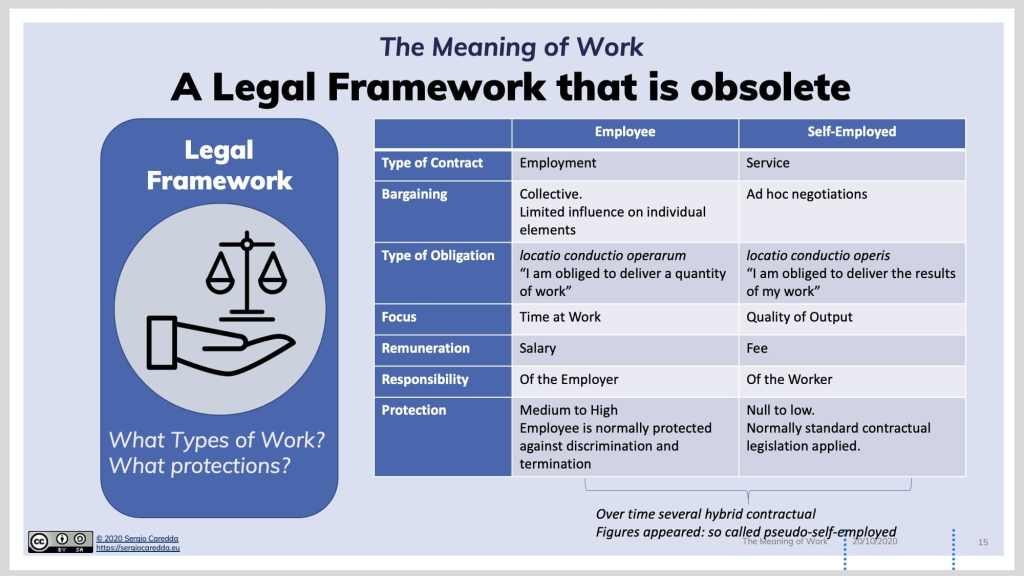
With the changes in production systems and the birth of the modern corporation, more and more Work moved away from the factories, and into a new generation of jobs that have been collectively named “white collars”. Work legislation has been slow in adapting, but in general terms, these recognised some level of responsibility for the pursuit of objectives, for a limited number of high ranked officials in a company. Often, the legal concept of “executive” and the level of real delegation and management do not correspond.
With the beginning of the automation revolution and the outsourcing trend, the relative weight of blue-collars has more and more diminished on the total workforce. Looking to purse efficiency, more and more companies have resorted to trying to compress labour cost by exploring alternative forms of collaboration. Some jobs have been outsourced to individuals. Instead of having an employment contract, individuals accepted to become a self-employed freelance, giving up some level of protection for the certainty of some income. This has started the development of a grey area of workers, often called pseudo-self-employed which do not have the bargaining power of true self-employed professionals, and yet have to resort to accepting non-employment contract to ensure survival. This trend has consolidated over time, also with the so-called gig-worker. Many countries have tried to legislate to offer additional protection for this class of workers, with varying degrees of success.
This has brought to a new reality, where the contracts initially developed for the people that needed more protection (lower-paid jobs, front-line worker, entry-level roles etc.) are instead protecting an already wealthier part of the working population.
Work and Accounting Principles
You heard it over and over again, companies claiming that people are their most valuable assets. In accounting terms, this is unfortunately not true. Companies do not control their employees. Therefore these are not treated as assets. Salaries are simply a line in the operative expenses portion of the balance sheets. Accounting principles are not in tune with the way that organisations have evolved. And this poses different types of issues:
- If I can automate a job with a robot, I have an accounting incentive to invest in the robot because I can classify that as an investment and include depreciation over time, having the additional advantage of slashing a “fixed cost” immediately.
- There are no incentives, in accounting terms, on investing in training and development activities for people.
Another element amplifies this issue. In business control terms I can distinguish between what I pay for employment contracts (which is part of my fixed costs) and what I pay for services (which instead is conceptually part of my variable costs). Which also explains the general convenience of moving towards these type of contracts as we have seen.
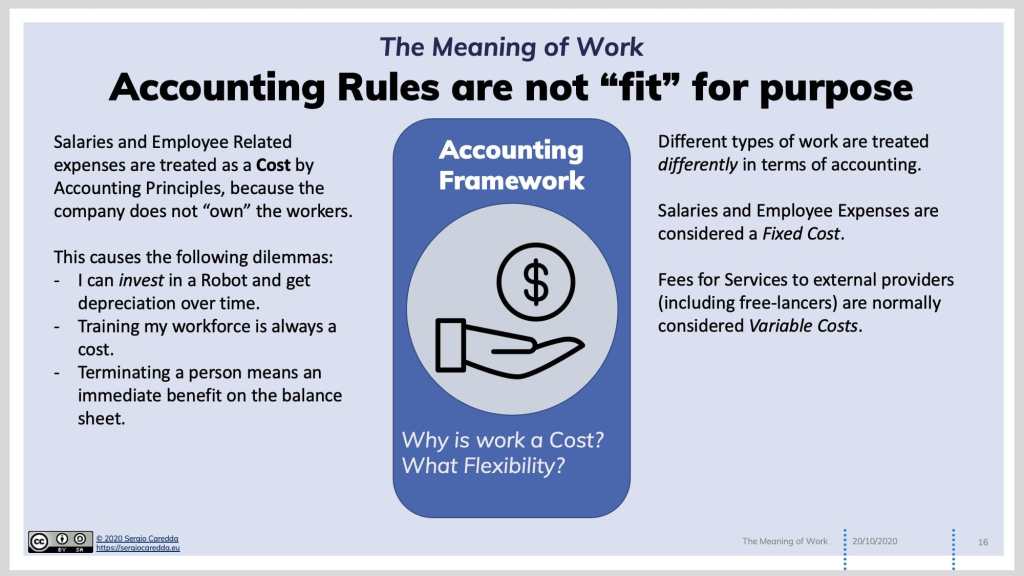
Work and Value Definition.
A third element to consider is linked to the perception of the Value of Work in economic terms. How can we measure it? The angle I want to mention is the same that is coming from the discussion about CEO compensation and their ratio towards the average pay in the company. How is the Value of a salary defined? Again, we have a big difference between those that have a bargaining power (often supported by executive compensation data providers, often hired by CEOs to “pump” compensation) and those instead that do not have it, and that often have only hope in collective bargaining and minimum wage regulations. I believe this issue is much broader and linked to the more general question of how Value is defined in our society, as Mariana Mazzucato mentions in her excellent book The Value of Everything. For example, Why are salaries higher on average in industries like finance and consulting, vs those of productive sectors?
People work hard and companies make big profits, but employees don’t see that they share in the wealth they help to create.
Mariana Mazzucato, Interview by Lynn Parramore
This element has a variety of impacts. The main one is making the labour market a completely imperfect market where demand and supply are not syncing correctly, which links to ripple effect that includes migrations (both inside countries and across countries), issues in education systems and so on.
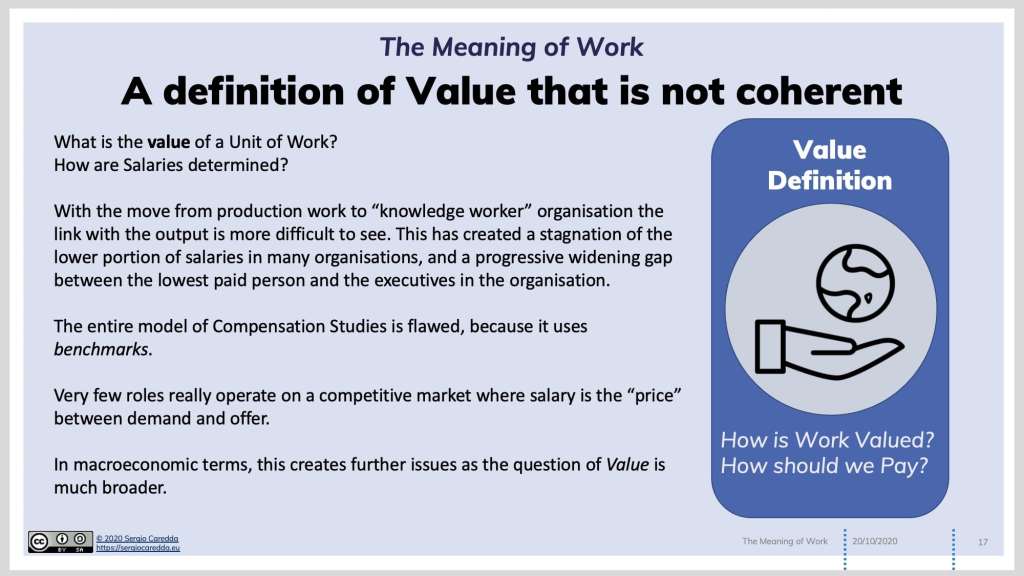
The understanding of value will also mean looking at entirely new narratives in Job Design. Today very few organisations really look at Potential Value that roles and jobs can perform in an organisation, as they are “locked” into a cost perspective only. That could unleash a lot of potential new value for companies and organisations across the world.
Without an overriding strategy of redefining work, workers represent cost savings rather than freed capacity to create new value for the business or the customer.
Jeff Schwartz, John Hagel, Maggie Wooll, Redefining work for new value, Deloitte
Consequences
The three elements above create an immediate number of consequences, among which, for example:
- In a period of difficulty, a company has an incentive to slash costs by reducing its workforce, even if this means lowering opportunities for future growth.
- Companies have incentives in outsourcing work to self-employed, even if this means less control on their “talent”.
- In most legislations, it is difficult to link compensation to the Value generated by the individual, even at higher levels in the organisation.
There are also several cultural consequences. The fact that Work is still seen as a quantity rather than as an output. The fact that salary increases are often the result of seniority rather than performance. The fact that “command and control” seem to be implicitly recognised by labour law (every HR manager knows that the only moment when you truly want a “micro-manager” is when you are in a labour court).
A First Conclusion
Reinventing Work is possible, as all the above elements are known and considered a limiting factor by many. What’s needed is the political will to “change the rules of the game”, aligning the current labour market with the needs of both organisations and the overall economy: an aspect not to forget.
What needs to be done are strong acts to deliver the following:
- A Change of Labour Law that puts in discussion the traditional split between “employment” and “free-lance” work, recognizing all the shades in between. Two options are there: either recognise the same degree of protection for all type of workers or create a system that links decreasing protection to the true bargaining power of each worker.
- A Change in Accounting Rules that ensure the recognition of the true value of “Human Capital” for a firm. This is not an easy task, as the ripple effects (for example on taxation) are many and variegated. A first step would be to ensure that Financial Analysts and Venture Capitalist start using a consistent set of intangible indicators to evaluate the investments in people. A change in the GAAP is however required, to ensure that also smaller companies can align on the new behaviours.
- A Change in Value Perception requires the strongest intervention because it will need a reinvention of the job markets as we know them, and a redefinition of the criteria we know on how salaries are established. A big endeavour, that will profit from changes in Labour Law and Accounting rules.
Reinventing Work for All
All of the above is needed also to ensure we find an holistic solution for the different issues that Work is being affected with. As we have seen in the previous articles, transitioning between different Discourses of Work is not an easy process, and takes time. Moreover, different types of workers will be affected differently by the trends we are seeing. We need to take this into consideration.
For this purpose, I tried to imagine a classification of workers based on two axes.
- First, the Type of Activity to be covered as a worker. I mapped them on the vertical axis with the bottom focused on standard and repetitive tasks.
- The second factor I have taken into account is the Bargaining Power of the worker in relationship with its (potential) employer. This can be, from left to right, low (or null) and high. In each quadrant, I have defined the essential characteristics presently, and in italic, the biggest challenge from an organisation perspective.
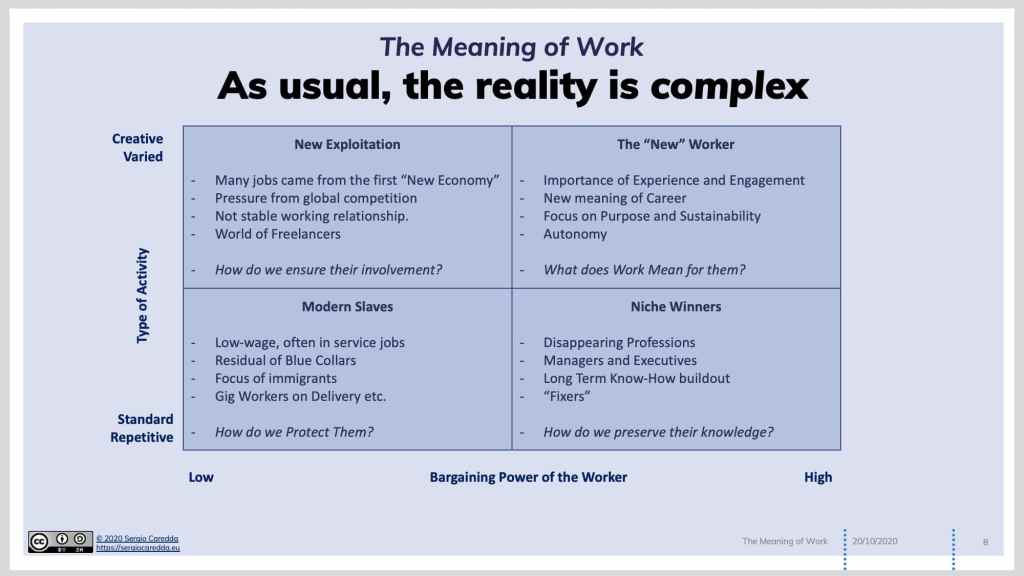
Let’s see the resulting quadrants more in detail. I try to give a short description to each, then try to identify what is the dominant Discourse of Work for that specific cluster, and then list three fundamental question we should address. As an individual, member of that cluster,. As an organisation that proposes Work for people in that cluster. And as the Government, trying to define their holistic impact.
Modern Slaves
Modern Slaves are people that do repetitive and pretty standard Work and have little bargaining power. Blue-collar workers, agricultural workers, service workers, retail workers, distribution centre workers, many are in this cluster. This is the cluster that attracts most migrants into western societies. It is an area that has been affected already by automation in the past, probably will not be targetted again, because under the current conditions human labour is cheaper in these areas and does not justify technology investments. Most of these roles are linked to a place, so they need to be performed in a specific location (with few exceptions, such as call centre associates). Productivity is still linked to the Quantity of Work, defined by a quantitative element (opening hours usually) or process (number of square meters cleaned or number of meals delivered). The big unknown is how much the change in the experience economy will affect this segment. Most of the trends will have a marginal to an adverse effect on this cluster. The main hope for them (beside governmental action) is the Redefinition of a Social Contract that recognises their vital contribution to the generation of Value. A significant risk is to continue widening the cleavage with the rich portion of society, dumping even more poverty on this cluster.
Dominant Discourse of Work: Work as Sustenance, Work as Punishment
The Key Questions for this Cluster:
- As an Individual: How do I survive this situation of poverty and uncertainty?
- As an Organisation: How can we ensure a good quality of customer service from an employee that is essentially exploited?
- As the Government: What is the cost for society of keeping these people into poverty? (Social assistance, but also criminality, healthcare etc.)
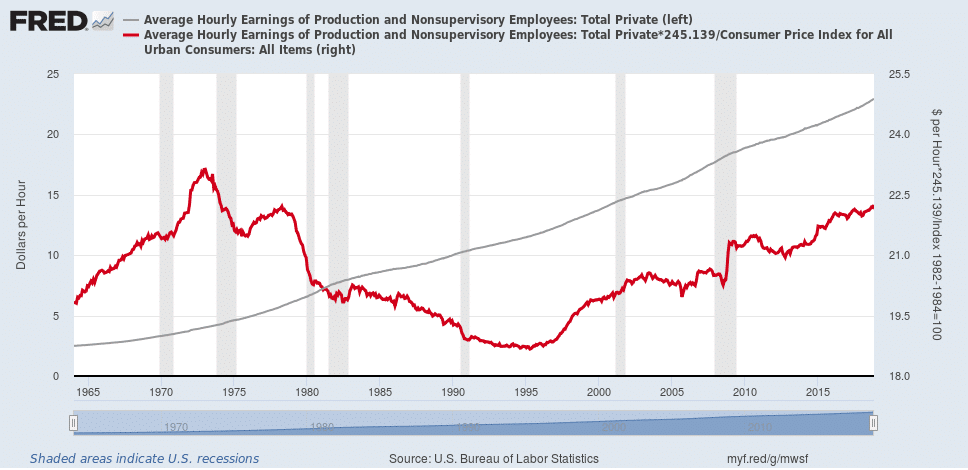
New Exploitation
New Exploitation is the cluster of people that work in creative and varied roles but still, have low bargaining power. Typically are younger or less-experienced worker, often in original but today inflated jobs. An interesting analysis of this category of workers comes from the book Overload that I have recently reviewed. Advertising, design, architecture, coding, software engineering, these are just some of the areas where this cluster expands. Often these people “work” through platforms, and do not have formal employment contracts. Globalisation has had a significant toll on these roles (you can get an excellent logo designer quickly through a platform out of Pakistan…). Some of the competencies that these people carry are critical for most organisations. Still, as they are living at the edges of the organised world, they currently get fractions of the Value they create. This cluster might have a mixed reaction to the trends we have seen. In a way, if companies accept having fully remote teams, this might give more chances to this cluster, but external collaborations should not be seen solely as a cost-cutting exercise. In many ways, these people also suffer from excessive focus on specialisation and STEM education. Becoming too expert in one field only will make these people easily susceptible, for example, to changes in technology. An element interestingly explored in The Job, the book by Ellen Ruppell Shell I recently reviewed. Automation is an element of increased risk into this area, especially because many of the tasks here can be reduced to algorithms.
In many ways, this cluster is a creation of the Work as Job discourse: by focusing so much on efficiency, it moved and outsourced many activities, not just through automation, but often also creative tasks. Education is a key element that we need to review to ensure better focus on the breadth of competence and not only depth.
Dominant Discourse of Work: Work as Sustenance, Work as Job
The Key Questions for this Cluster:
- As an Individual: How can I plan my future without any certainty? (Will I be able to have a family? Own a House? Get Medical Care? Get a pension?)
- As an Organisation: How can we ensure the involvement of non-employees? How do we retain their Talent? How do we build loyalty and engagement?
- As the Government: How do we increase protection and ensure I can collect adequate taxation to support services? How do we reform education to increase the skills of people and their resilience?
Niche Winners
Niche Winners: these are people that have “safe” jobs today because they hold on specific skills or know-how that are not easily replicable. Even if sometimes they cover standard activities, their bargaining power is high. This is the domain of senior management focused on operations, marketing, sales, as well as many professional and technical roles on specific competency areas (legal, accounting, maintenance, training, etc.).
Some trends we have seen, such as the move towards self-management and self-organisation, will, however, impact some of these roles. Automation is specifically targetting these areas because it is here where the business case is more consistent. An example is legal: already today, it is possible to automate many of the tasks that junior lawyers typically did. This because of cost pressures, as also large corporations questioned the high fees needed to have prime legal services. Similarly, maintenance has been one of the areas more affected by predictive analytics, trying to prevent issues from happening.
Risj for the people in this cluster is to move, quickly, towards the left side of the matrix.
Dominant Discourse of Work: Work as Craftsmanship
The Key Questions for this Cluster:
- As an Individual: How do I protect and develop my competence?
- As an Organisation: How do we preserve their knowledge and added value?
- As the Government: How do we protect the wages of this population, as this is the area where most taxation comes from? How do we reform Education?
The New Workers
The New Workers: these are the people that get often referred to when talking about “The Future of Work”. Creative and varied jobs that are less subject to automation and have relatively high bargaining power. This is the area where organisations are already investing in terms of Employee Experience and Engagement. Yet this is the group of people that is more interrogating itself on the meaning of work, and are probably the cluster that is moving into the New Discourse of Work as Personal Realisation. It is the area where we can clearly see a distinctive set of competencies needed, and that goes beyond the traditional efficiency-focused reality of the industrial society. Exactly because there’s a focus on effectiveness, the impact of Automation is unknown in this area.
Dominant Discourse of Work: Work as Personal Realisation
The Key Questions for this Cluster:
- As an Individual: How do I freely define the Meaning of Work?
- As an Organisation: How do we Design Work in an attractive and innovative way?
- As the Government: How do we reinvent the Social Contract to ensure their full contribution to society?
From Merit to Dignity of Work.
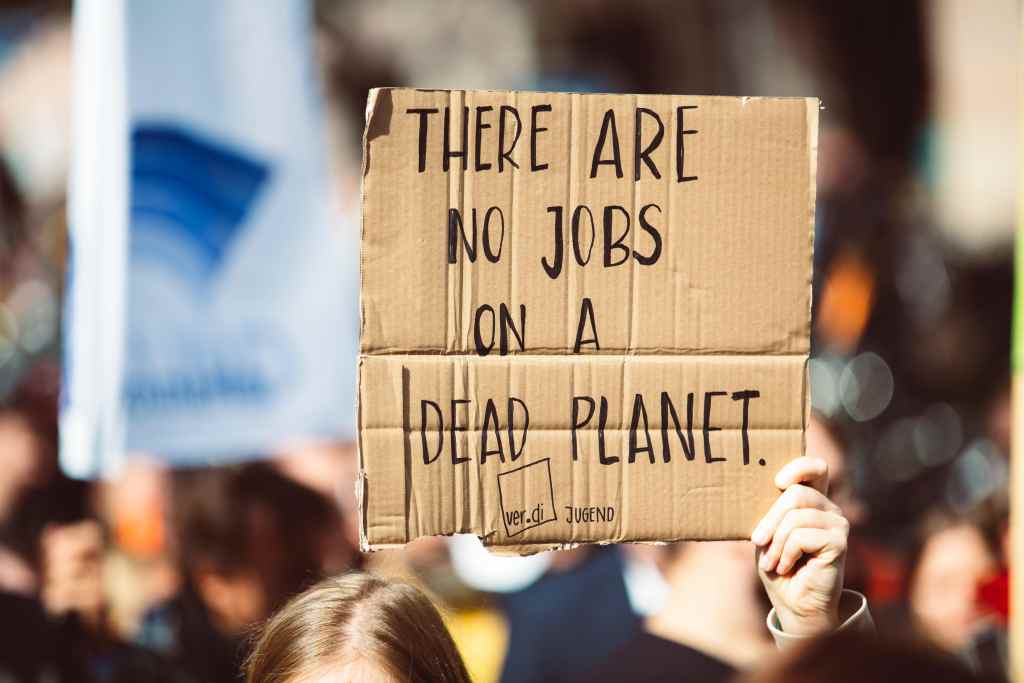
(…) individuals can be smarter about how much we let work take over our lives and how many hours we put in before deciding we must protect our sleep and our health. But individuals do not have the leverage to make those changes happen on their own. The good news is that together, we do. It is time to make that happen.
Erin L. Kelly and Phyllis Moen, Overload, page 217
Too much of the current discussion on the Future of Work and the role of the Knowledge Worker is simply forgetting the rest of the working population. We need to think holistically and find solutions that help elevate the entire workforce in its quest for the Meaning of Work. I truly believe that one of the biggest problems we need to escape from is moving away from the narrative of Meritocracy, an apparently positive concept that, however, leads to many unfavorable effects for our society.
The concept of Meritocracy highlights the ability of the individual to “climb” the hierarchical ladder in an organisation and the societal ladder on its own merit. The concept has developed a lot in the US, and has then moved back into other western cultures. It carries an enormous weight in terms of the “heroic journeys” of the many people that “self-made” themselves. It’s easy to find echoes of the Discourse of Work as Salvation, particularly mediated through calvinism. But this concept has been widely adopted in the Discourse of Work as Job, as a sign of the “efficiency” of the hierarchical system to nurture itself. Clustered with the democratic foundation and liberal thinking that market forces would allow the best to emerge, Meritocracy has been called as the driving force for career and growth.
Yet, there a few problematic issues that this raises. First of all, the word itself Meritocracy has a satirical origin. In 1958, Michael Young published a book called The Rise of the Meritocracy as a satirical criticism of the concept of meritocracy. The book describes a dystopian society in a future United Kingdom in which intelligence and merit have become the central tenet of society, replacing previous divisions of social class and creating a society stratified between a merited power holding elite and a disenfranchised underclass of the less merited. Yet, the word became widely adopted with a positive meaning in the English language (and beyond, as it is used in many other languages as well). In 2001 Young commented on the adoption of Meritocracy by Tony Blair’s Labour Party in an article in The Guardian.
If meritocrats believe, as more and more of them are encouraged to, that their advancement comes from their own merits, they can feel they deserve whatever they can get.
Michael Young, Down with meritocracy, The Guardian, June 29, 2001
The problem can be crystallised in the paradox that it is the CEO that sets their own salary. Or, to tell it in a different way, it is the elite class which defines the merit criteria. Creating a self-fulfilling prophecy. As a matter of fact, the idea of ladder progression simply doesn’t hold true. Social mobility, even in a country that focused on this as part of its foundational narrative, such s the US, doesn’t exist anymore.
Meritocracy is the ideology that constraints the advancement of women and minorities at work.
Why?
Because merit is still defined vastly by white men.
The US Philosopher Michael Sandel has captured this element very well in his book The Tyranny of Merit. In an interview to The Guardian, Sandel states that “The solution to problems of globalisation and inequality – and we heard this on both sides of the Atlantic – was that those who work hard and play by the rules should be able to rise as far as their effort and talents will take them. This is what I call in the book the ‘rhetoric of rising’. It became an article of faith, a seemingly uncontroversial trope. We will make a truly level playing field, it was said by the centre-left, so that everyone has an equal chance. And if we do, and so far as we do, then those who rise by dint of effort, talent, hard work will deserve their place, will have earned it.”
The reality is, however, under our eyes. Jobs went away from one country to a cheaper one, sometimes based on education levels, but more often based on efficiency factors. The reality shows that social mobility does not really exist. Rich students still get better scores in tests. And factors in a very dark and demoralising side for the people that do not succeed. “The implication is that those who do not rise will have no one to blame but themselves.” An element also wonderfully examined in the book The Job. WHich is also why Sandes sees this as a big political issue. The populist backlash of recent years has been a revolt against the tyranny of merit, as it has been experienced by those who feel humiliated by meritocracy and by this entire political project.
This is a moment to begin a debate about the dignity of work; about the rewards of work both in terms of pay but also in terms of esteem. We now realise how deeply dependent we are, not just on doctors and nurses, but delivery workers, grocery store clerks, warehouse workers, lorry drivers, home healthcare providers and childcare workers, many of them in the gig economy. We call them key workers and yet these are oftentimes not the best paid or the most honoured workers.
Michael Sandel, The Observer, The Guardian, Sept. 6th 2020
Work Dignity becomes the central pillar of the New Discourse of Work in its ambition to become holistic, addressing the social inequalities left over from the industrial society. As Sandel points out, it is not a question of salaries only, but of esteem. Which is why self-realisation is paramount here not solely for the knowledge worker, but for every worker.
To achieve this, we need to focus on creating equal conditions, not equal opportunities or equal results. Let’s give an example: we have seen that systems thinking is one of the most important skills for succeeding in a VUCA environment. Its development necessitates to the exposure of a complex set of stimuli from the early years of education. How can you possibly develop it, though, if you are coming from the suburbs of an African city, where your key focus already from childhood has been survival?
Our focus as a society should be to build an entirely new Social Contract, whereby those that are already able to establish a meaningful relationship with work (thanks to their competency profile) can help and support those people that are instead trapped in other clusters. This should not be a paternalistic endeavour, though, and also not an exercise of class-building conscience, as socialism tried. It needs to be a journey towards Dignity whereby each individual can really establish their own relationship with the meaning of work.

Consolidating Trends
It’s time to move towards a conclusion of our research on The Meaning of Work. I want to do this by summarising the key trends that we have explored so far, and that constitute the true drivers for the emergency of The New Discourse of Work as Personal Realisation.
1. Work from
Everywhere
Remote Work is becoming the new normal. Not just from home, but from everywhere.
2. Creativity and
Niche Jobs
Increased Automation will push more value into creativity and niche know-how
3. Redefinition of
Performance
Distributed teams will also push for a redefinition of what high performance means.
4. New “Social Contract”
for Work
Companies becoming truly multi-stakeholders, will develop a new relationship with all their workers (also indirect ones)
5. Human-Centred Organisation Design
New focus on Experience and Engagement, will ultimately reward organisations experimenting with new governance models
6. From Career to
Learning Journey
We will move away from linear career and clear boundaries between work, hobbies and family. Learning will be the read thread.
Let’s see them more in detail.
Work from Everywhere
The most massive technology experiment of social technology adoption has proved the feasibility of remote Work. Joined with the need that companies face seeking new efficiency sources, ample office space seems to be the first that will be hit. Home Working will become fully Remote Working, with different speed and maturity levels depending on the industry and company. This will probably have a long-tail impact on the way Cities work, giving a new advantage to smaller cities. Potentially this could also open up a different take on the “war for talent”, and a possibility to circumvent increasing limits in visa and international mobility. This has the potential to hit big the world of airlines and travel in general, which still derive most of its profit from business travellers. What’s unknown? The most significant element to be defined is how creativity and innovation, in general, can work with limited human contact. How can we recreate the serendipity needed for creativity in a remote set-up?
Creativity and Niche Know-How
With AI and Machine Learning developing further, opportunities for automation are moving ahead in many areas and will displace many new jobs, also among “white collars”. A reaction to this can be twofold: on one side focusing on creativity in many roles, as a way to make jobs less replicable by machines. A second option is to focus on niche know-how, buckets of competence that are limited or too complex to be replicated by AI and might give opportunities. In this area, a big question mark will be the future of the Experience Economy. So much of the reaction to AI was looked into the human to human relationship in Work, from sales associate to restaurant waiters, how the bit will these jobs now be hit?
Redefinition of Performance
If Work doesn’t happen in a co-located office environment, how will performance be evaluated? In an entirely remote workforce, concepts like “four-days week” or “working time” might become obsolete quickly. We need a new way of defining what high performance means in this context. And new ways of rewarding Work, balancing effort, commitment and achievement.
New Social Contract for Work.
This is probably the trend that Covid-19 is influencing the most. The recent crisis has projected back front-line workers to the centre of many operations, from cashiers at grocery stores, to nurses in hospitals, to logistics carriers. There is a general sense of gratitude towards these people, who suffered to a higher toll in terms of contagion of the virus. The recognition of their role will probably help in translating what a “Multi-Stakeholder” approach means when we talk about employees. Invoked by many, promised even by the Business Round Table, we need now to see what this indeed translates into, but will probably mean a better focus on the broader needs of all employees. Not just in a paternalistic sense. Plus, perhaps, consolidating a trend that was already evident, part of this Social Contract will also extend to suppliers and service collaborators.
Human Centered Organisation Design
Organisation Design is more and more a need for new organisations to prosper. We are seeing more and more experiments of Organisation Models going in the direction of flatter structures with participative governance. If these experiments can move away from the elitist circle and grounded in the reality of Work, we will see great success and a changing concept of the relationship between Work and the Organisation. This will ultimately enable, in a virtuous cycle, the redefinition of Value for all the actors (employer, employees, suppliers, stakeholders), with a sharper focus on sustainability.
From Career to Learning Journey
At an individual level, this crisis has broken a lot of the barriers we had built between Work, private life, children, hobbies and interests. This fact might support the already existing trend to redefine experience not in “sequential blocks” (full-time education, full-time employment, full-time retirement), but in a journey marked by continually moving into these three “boxes”. The driver of changes in this journey will probably be the need to Learn and Adapt to change. It will recognise that the education system simply cannot provide all the knowledge needed for life. With life expectancy increasing, it is also impossible to assume that we can stay “unemployed” for 30% of it. This trend alone will have a significant impact on the way the job market works.
Conclusion: Making Work Worthy
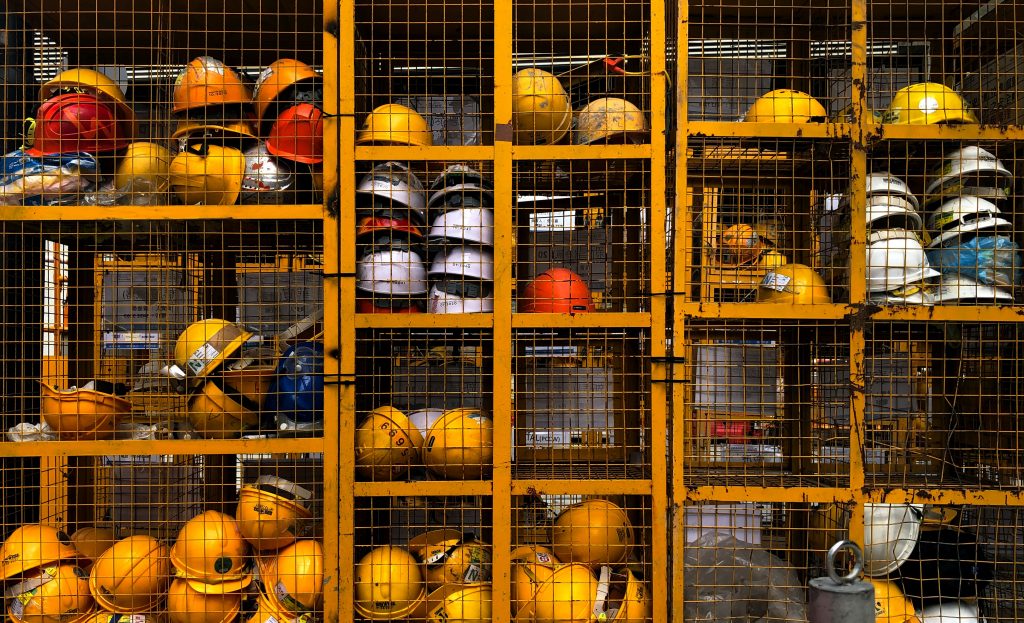
Covid 19 has created a big experiment of collective sense-making, especially given that the pandemic is not a black swan event, but was predicted by many. It has produced many impacts that will have ripple effects for many years to come. A lot of weak signals are there about new things to come. The question is how much of this will effectively create an effect in the future. For sure, we can do a lot in terms of developing our competencies for the future of Work.
Yet, as History has shown, our relationship with Work is variegated. We tend to identify our lives with the job we do, but this has been a recent development in human life. The industrial revolution has inserted an artificial segregation between work and personal life, creating many issues that sometime even cause health problems. We need to have the courage to recover our wholeness as a first step.
The development of technologies, focused on efficiency gains, provides probably the biggest challenge to the work as we have all learnt to know. Factories and now Offices are losing meaning, and with them, an entire connotation of Work as an engineerable pattern. We need instead to rediscover and preserve Work as a source of personal esteem and human dignity.
This journey, over the seven articles that constitute this series, has been long. Initially, it felt like a detour, but it has personally helped me in opening my eyes on many aspects that are relevant for our lives. I now have a much different understanding of how issues such as Diversity, Engagement, Employee Experience, Customer Satisfaction, Performance, are all heavily influenced by the meaning we give to work.
This is also no the end of the journey, but rather a beginning in trying to identify what the impact of all what I have written will have on the way organisations gets designed today and in the future. I hope I can count on your feedback on this.
What’s your view on Reinventing Work?

Article by channel:
Everything you need to know about Digital Transformation
The best articles, news and events direct to your inbox
Read more articles tagged: Featured, Future of Work


